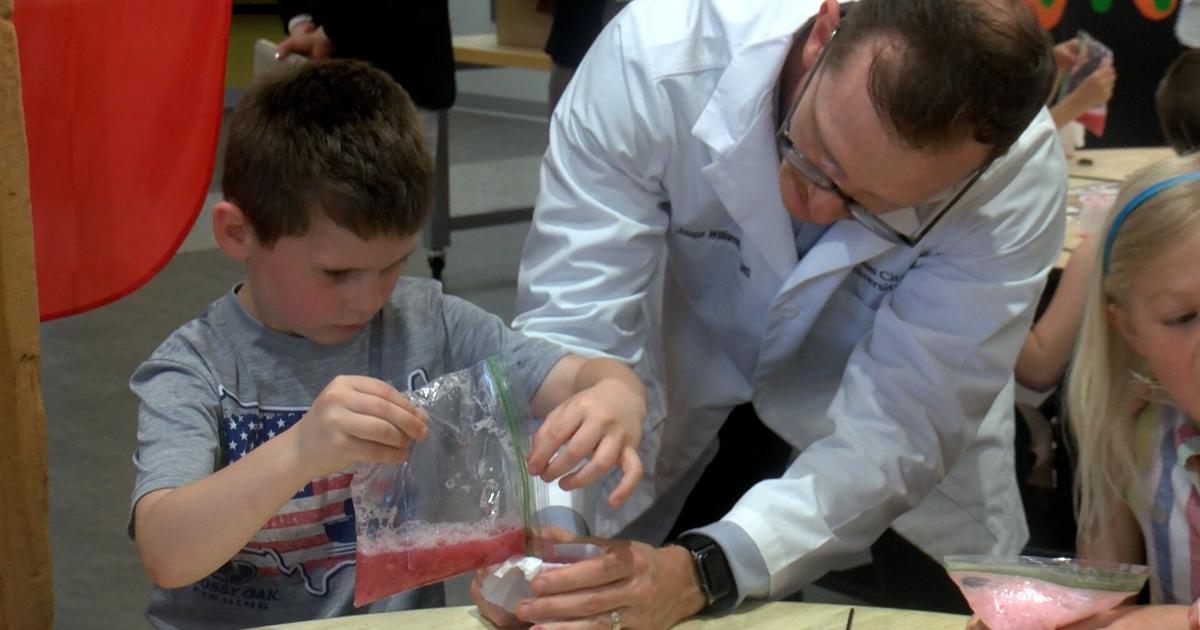Elementary students at RISE Elementary in Neosho participated in a hands-on DNA extraction experiment using strawberries
Dr. Joseph Williams from Kansas City University led the lesson, teaching students to isolate DNA using household items
The experiment aims to inspire curiosity and scientific thinking in young students, potentially sparking interest in future medical careers
From Strawberries to Science: Neosho Students Extract DNA
Elementary students in Neosho got a unique science lesson Wednesday when a Kansas City University professor taught them a lesson on DNA with strawberries rather than textbooks.
Dr. Joseph Williams, an instructor and researcher at Kansas City University, visited RISE Elementary School to provide students with a hands-on approach to understanding the complex topic of DNA.
“We’re going to extract DNA from living or recently picked strawberry fruit in a very similar way that we extract DNA from human cells, if the genetic test was ever ordered by a physician in a research laboratory,” Williams explained to the excited students.
The children participated in an experiment where they learned to isolate DNA from strawberries using common household items. This process mirrors techniques that researchers and medical professionals use in their daily work, giving students a glimpse into real scientific methods.
For many students, this was their first experience with DNA extraction outside of textbook illustrations. The hands-on nature of the lesson allowed them to engage directly with scientific concepts that might otherwise seem abstract or difficult to understand.
Lillian French, one of the participating students, expressed her enthusiasm for the experiment. “It was awesome,” she said. “Science is important to learn because it teaches you a lot of stuff about the earth.”
The classroom buzzed with excitement as dozens of students successfully extracted DNA on their own. This type of engagement is precisely what Dr. Williams hopes to foster through his outreach work with elementary schools.
“The best part about this with the kids is their exploration and their curiosity,” Williams said. “And that same skill is what we’re trying to enhance and what we’re trying to encourage at the medical school level as well. It’s not a different skill. It’s something that translates up and down the continuum of education.”
Williams believes these early experiences with science can have lasting impacts on students’ future interests and career paths. He noted that many physicians develop their passion for medicine at a young age, often sparked by engaging science experiences like this one.
“When you hear about physicians who end up in the workplace and in our communities now, often times that passion starts at a really young age,” he said. “And the best physicians are the same ones that are curious. They’re compassionate, and through the lens of science, we can explore many of those same things we want to foster the best we can.”
Beyond teaching specific scientific concepts, Williams hopes students take away broader lessons about curiosity and critical thinking. He emphasized that learning to ask good questions and understanding how science relates to everyday life are valuable skills regardless of what career path students ultimately choose.
This type of community engagement from higher education institutions like Kansas City University helps bridge the gap between advanced scientific research and early education, potentially inspiring the next generation of scientists, doctors, and researchers.
For the students at RISE Elementary, extracting DNA from strawberries may be their first step toward a lifelong interest in science and medicine. As they carefully followed Dr. Williams’ instructions and watched the DNA appear before their eyes, they experienced firsthand the excitement of scientific discovery.
COPYRIGHT 2025 BY KOAM NEWS NOW. ALL RIGHTS RESERVED. THIS MATERIAL MAY NOT BE PUBLISHED, BROADCAST, REWRITTEN OR REDISTRIBUTED.

